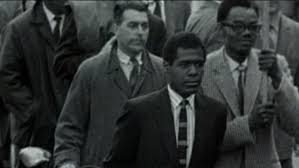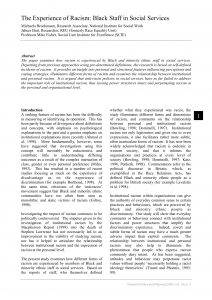Jo Moriarty (Senior Research Fellow) and Prof Jill Manthorpe (Director) of the NIHR Health & Social Care Workforce Research Unit, King’s College London. (1246 words)
In the aftermath of the pulling down of the statue of the merchant and slave trader, Edward Colston, in the June of this year, discussions took place about how best to replace it. We were intrigued to read one suggestion that it should be replaced by a statue of Paul Stephenson. Who was he and what was the boycott we wondered?

Paul Stephenson leading the Bristol bus boycott in 1963 (Photo: ITV)
We soon found out that he was the first black social worker in Bristol (BBC Newsround 2018). The Bristol Bus Company refused to employ black people on bus crews and, inspired by the refusal of Rosa Parks to give up her seat on a bus and the ensuing Montgomery Bus Boycott, Stephenson was one of a group of people who led a bus boycott in Bristol in 1963.
The cause was taken up by the wider black community and white sympathisers in Bristol. Within a few months, the company succumbed to pressure and ended its ban. The following year Stephenson refused to leave a pub until he was served. He is now widely recognised as having played an important part in the passage of the 1965 Race Relations Act and was awarded an OBE in 2009.
Now there is greater recognition of the contribution of Mary Seacole to nursing, we are more familiar with the idea that some groups of people and individuals have been—in the words of Sheila Rowbotham (1976)—‘hidden from history’, we have wondered how many social care practitioners have been hidden from social care history. Some years ago, one of us did a small piece of work for Age UK examining what local branches were doing to reach out to older people from black and minority ethnic groups in their area (Moriarty 2013). One of the participants was a community worker from an Asian background. She had good links with the local radio station and was a regular guest talking about diet, exercise, and health. A keen walker, she had been involved in setting up a local walking group which went on walks from the city into the local countryside. She explained to me that people from black and minority ethnic groups had less access to green spaces and were less likely to visit natural areas. Now that organisations such as the National Trust (2020), the Runnymede Trust (Collier 2020) and Sport England (2020) are prioritising attempts to reduce the impact of this ethnic inequality, it is important to remember how many national initiatives generally have their origins in the efforts made by local activists and community groups.
In the UK we sometimes think we do not have many past accounts of black social workers and their practice and influence. We look with huge interest, for instance, at studies from the USA where there is much greater evidence and perhaps more interest in social work history. Gary and Gary (1994), for example, presented a detailed overview of Black people who took part in USA social work education from 1900-1930. However, Williams’ and Bernard’s (2019) timeline in the context of Black History Month is a helpful resource for the many influences and influencers on social work in the UK from the 1940s onwards.
But there are many studies in the UK which now are part of history, such as the chapter by Watt and Cook (1989) on ‘Black Women in Social Services Departments’. There is also the resource (now online) of the doctoral thesis of Gail Lewis (1997) who studied the entry of black women into local authority social services departments and their practice as qualified social workers in the 1980s. As part of her thesis she interviewed 10 managers (four from ethnic minorities) and 22 black female social workers employed up to and including team manager level.
Brockmann, Butt and Fisher (2001) presented a searing analysis of the Black and minority ethnic social services workers’ experiences of racism in social services departments (their survey included people working in manager, field worker, residential worker, and home care worker roles). Twenty to thirty years ago there seems to have been a step-change in the numbers of studies of black social workers’ experiences—important to remember today as they provide a baseline of evidence (see also, for example, Williams 1995). While most are set in the workplace, other studies were emerging focusing on teaching and placement experiences as both students and practice teachers (e.g. Stubbs 1985; Stokes 1996; Wainwright 2003).
The internet has also provided opportunities for social workers whose experiences were not collected as part of research studies to be heard. These include, for example, the stories of black social workers who made efforts through the Association of Black Social Workers and Allied Professions (formed in 1983) and other initiatives to find adoptive and foster families from black communities (de Souza 2019).
This blog provides some indications of how the internet has helped social work stakeholders to find out more about black history in the profession and in wider social care. Academic studies have often been hidden behind the pay walls of journals or were expensive to access through libraries. Moves to increase open access publishing will assist in accessing data and stories. These may show more of black history in the profession and workplace but also wider influences, activity, and legacies.
Jo Moriarty (Senior Research Fellow) and Prof Jill Manthorpe (Director) at the NIHR Health & Social Care Workforce Research Unit, King’s College London.
References
BBC Newsround. 2018. Black History Month: The men who made history in Britain. https://www.bbc.co.uk/newsround/41775249
Brockmann, Michelle, Butt, Jabeer, and Fisher, Mike. 2001. The Experience of Racism: Black Staff in Social Services, Research Policy and Planning, http://ssrg.org.uk/wp-content/uploads/2012/02/rpp192/article1.pdf
Collier, Beth. 2020. The race factor in access to green space. Race Matters. https://www.runnymedetrust.org/blog/the-race-factor-in-access-to-green-space
Gary, Robenia Baker and Gary, Lawrence E. 1994. The History of Social Work Education for Black People 1900-1930,”The Journal of Sociology & Social Welfare: 21(1) , Article 7. https://scholarworks.wmich.edu/cgi/viewcontent.cgi?article=2109&context=jssw
De Souza, Savita. 2019. Celebrating Soul Workers, Coram/BAFF, 25 April https://corambaaf.org.uk/updates/celebrating-soul-workers
Lewis, Gail. 1997. Living the differences: ethnicity, gender and social work. PhD thesis The Open University https://core.ac.uk/download/pdf/2884.pdf
Moriarty, Jo. 2013. (for funder only) Review of Age UK’s Services for Black and Minority Ethnic Older People, London, King’s College London, Social Care Workforce Research Unit.
National Trust. 2020. Press release: New research shows £5.5bn fund needed to level up access to urban green space as part of UK’s green recovery. London: National Trust, accessed 7 October 2020. https://www.nationaltrust.org.uk/press-release/new-research-shows-55bn-fund-needed-to-level-up-access-to-urban-green-space-as-part-of-uks-green-recovery
Rowbotham, Sheila. 1976. Hidden from History: Rediscovering women in history from the 17th century to the present. London: Vintage Books.
Sport England. 2020. Sport for All? Why ethnicity and culture matters in sport and physical activity.Sport England, accessed 7 October 2020. https://sportengland-production-files.s3.eu-west-2.amazonaws.com/s3fs-public/2020-02/Sportforallreport.pdf?td0pMbTNOs7caOjvMZ0HCRPwsI3jGnFA
Stokes Idris. 1996. Black Practice Teachers: A Review of Some Literature and Its Meaning for Social Work Education and Practice, Social Work Education, 15(2) pp. 5-20.
Stubbs, Paul. 1985.The Employment of Black Social Workers: from ‘ethnic sensitivity’ to anti-racism. Critical Social Policy, 12, Spring 85, pp. 6-27.
Wainwright, John. 2003. (Anti)-Racism, Ethnicity and Social Work. A Study of Practice Teaching and Learning Outcomes in Liverpool, Unpublished PhD thesis. University of Liverpool.
Williams, Jenny. 1995. ‘Black staff in social services’, in Balloch, Sue, Andrew, Toby, Ginn, Jay, McLean, John, Pahl, Jan, and Williams, Jenny. (eds) Working in the Social Services, London: National Institute for Social Work.
Williams, Charlotte, and Bernard, Claudia. 2019. Black History Month: a provocation and a timeline, Critical and Radical Social Work. 6(3), pp. 387-406. https://research.gold.ac.uk/25236/7/Black%20History%20Month-%20A%20Provocation%20and%20Timeline%20.pdf
